
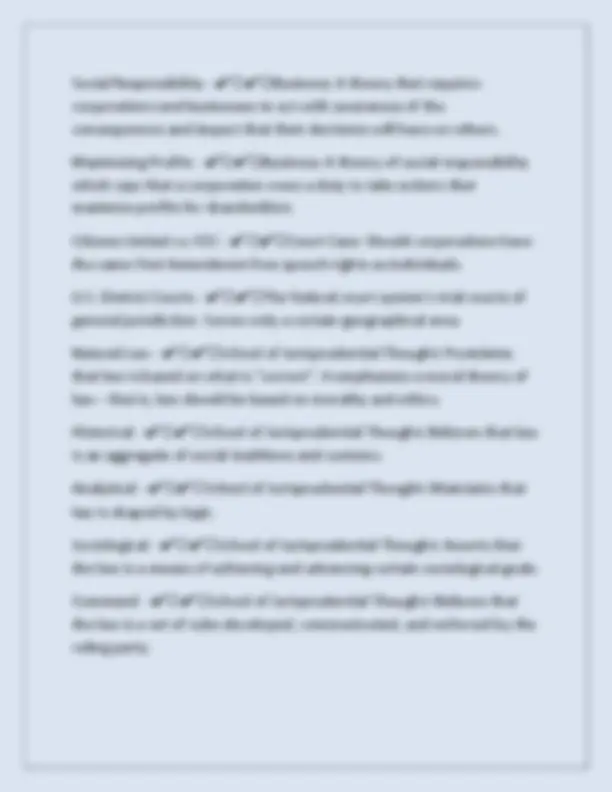
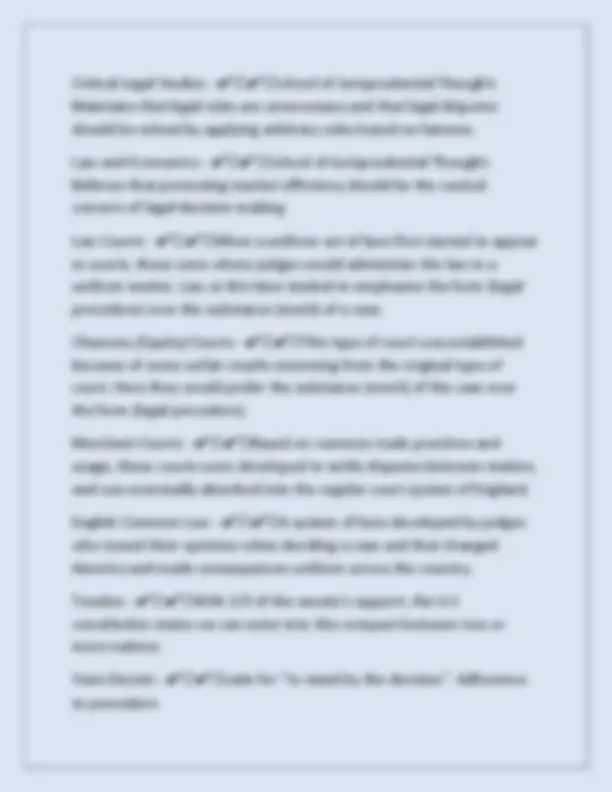
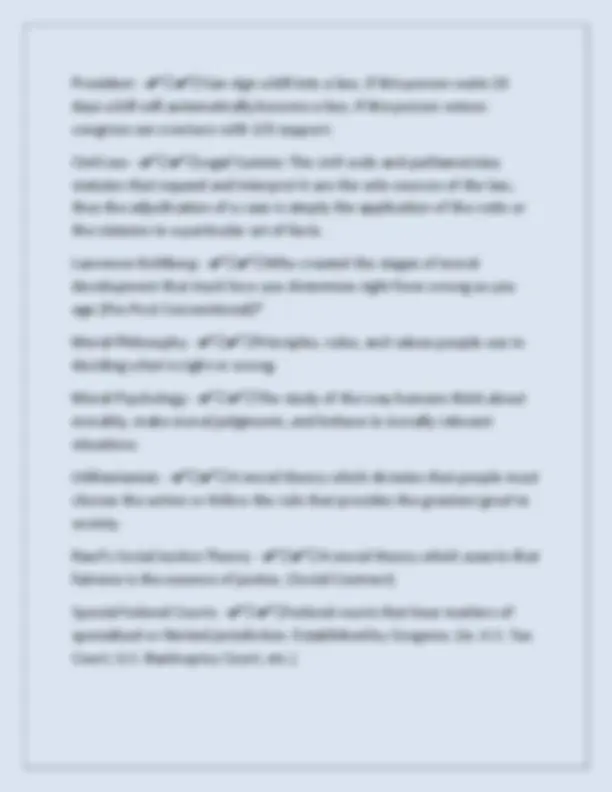
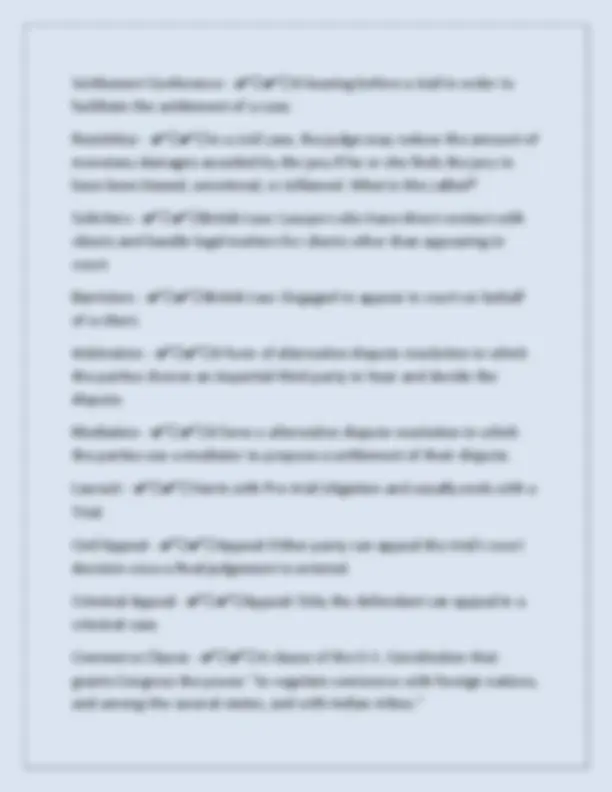
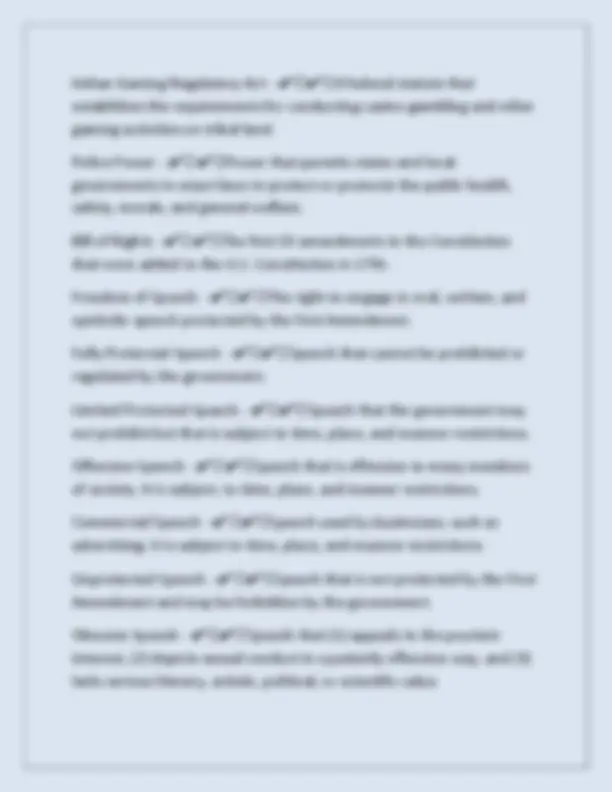
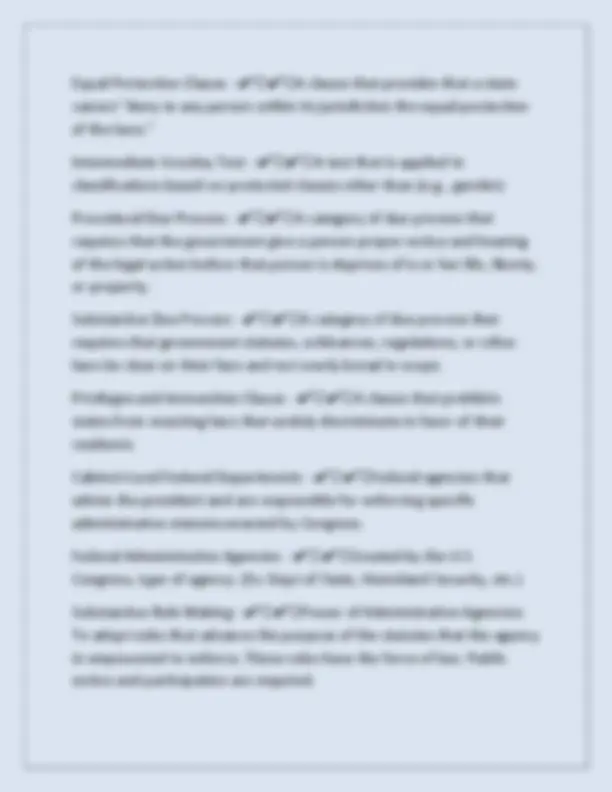


Study with the several resources on Docsity

Earn points by helping other students or get them with a premium plan


Prepare for your exams
Study with the several resources on Docsity

Earn points to download
Earn points by helping other students or get them with a premium plan
Community
Ask the community for help and clear up your study doubts
Discover the best universities in your country according to Docsity users
Free resources
Download our free guides on studying techniques, anxiety management strategies, and thesis advice from Docsity tutors
A comprehensive set of 100 quiz questions and answers covering various legal concepts relevant to law and business, including defamation, emotional distress, negligence, strict liability, criminal law, business ethics, and legal systems. It is a valuable resource for students preparing for exams or seeking to reinforce their understanding of key legal principles.
Typology: Exams
1 / 12

This page cannot be seen from the preview
Don't miss anything!







Defamation of Character - ✔ ✔ False statements made by one person about another. In court, the plaintiff must prove that the defendant made an untrue statement of fact about the plaintiff and the statement was intentionally or accidentally published to a third party.
International Infliction of Emotional Distress - ✔ ✔ A tort that says a person whose extreme and outrageous conduct intentionally or recklessly causes severe emotional distress to another person is liable for that emotional distress.
Res Ipsa Loquitor - ✔ ✔ A tort in which the presumption of negligence arises because the defendant was in exclusive control of the situation and the plaintiff would not have suffered injury but for someone's negligence.
Negligence Per Se - ✔ ✔ A tort in which the violation of a statute or an ordinance constitutes the breach of the duty of care.
Assumption of the Risk - ✔ ✔ A defense a defendant can use against a plaintiff who knowingly and voluntarily enters into or participates in a risky activity that results in injury.
Comparative Negligence - ✔ ✔ A doctrine under which damages are apportioned according to fault.
Strict Liability - ✔ ✔ Liability without fault.
Felony - ✔ ✔ The most serious type of crime; inherently evil crime. Most crimes against persons and some business-related crimes are felonies.
Misdemeanor - ✔ ✔ A crime that is less serious than a felony; not inherently evil but prohibited by society. Many crimes against property are misdemeanors.
Embezzlement - ✔ ✔ The fraudulent conversion of property by a person to whom that property was entrusted.
Extortion - ✔ ✔ A threat to expose something about another person unless that other person gives money or property. (AKA: blackmail)
RICO - ✔ ✔ A federal act that provides for both criminal and civil penalties for racketeering.
Privilege Against Self-Incrimination - ✔ ✔ The 5th Amendment provision that a person may not be required to be a witness against himself or herself in a criminal case.
Burden of Proof - ✔ ✔ Responsibility of the government to prove that the accused is guilty of the crime charged.
Social Contract - ✔ ✔ An implicit agreement among the members of a society to cooperate for social benefits.
Section 406 (Sarbanes-Oxley Act) - ✔ ✔ Section of an Act that requires a public company to disclose whether it has adopted a code of ethics for senior financial officers, including its principal financial officer and principal accounting officer.
Critical Legal Studies - ✔ ✔ School of Jurisprudential Thought: Maintains that legal rules are unnecessary and that legal disputes should be solved by applying arbitrary rules based on fairness.
Law and Economics - ✔ ✔ School of Jurisprudential Thought: Believes that promoting market efficiency should be the central concern of legal decision making.
Law Courts - ✔ ✔ When a uniform set of laws first started to appear in courts, these were where judges would administer the law in a uniform matter. Law at this time tended to emphasize the form (legal procedure) over the substance (merit) of a case.
Chancery (Equity) Courts - ✔ ✔ This type of court was established because of some unfair results stemming from the original type of court. Here they would prefer the substance (merit) of the case over the form (legal procedure).
Merchant Courts - ✔ ✔ Based on common trade practices and usage, these courts were developed to settle disputes between traders, and was eventually absorbed into the regular court system of England.
English Common Law - ✔ ✔ A system of laws developed by judges who issued their opinions when deciding a case and that changed America and made consequences uniform across the country.
Treaties - ✔ ✔ With 2/3 of the senate's support, the U.S constitution states we can enter into this compact between two or more nations.
Stare Decisis - ✔ ✔ Latin for "to stand by the decision". Adherence to precedent.
President - ✔ ✔ Can sign a bill into a law, if this person waits 10 days a bill will automatically become a law, if this person vetoes congress can overturn with 2/3 support.
Civil Law - ✔ ✔ Legal System: The civil code and parliamentary statutes that expand and interpret it are the sole sources of the law, thus the adjudication of a case is simply the application of the code or the statutes to a particular set of facts.
Lawrence Kohlberg - ✔ ✔ Who created the stages of moral development that track how you determine right from wrong as you age (Pre-Post Conventional)?
Moral Philosophy - ✔ ✔ Principles, rules, and values people use in deciding what is right or wrong.
Moral Psychology - ✔ ✔ The study of the way humans think about morality, make moral judgments, and behave in morally relevant situations.
Utilitarianism - ✔ ✔ A moral theory which dictates that people must choose the action or follow the rule that provides the greatest good to society.
Rawl's Social Justice Theory - ✔ ✔ A moral theory which asserts that fairness is the essence of justice. (Social Contract)
Special Federal Courts - ✔ ✔ Federal courts that hear matters of specialized or limited jurisdiction. Established by Congress. (ie. U.S. Tax Court, U.S. Bankruptcy Court, etc.)
Choice-of-Law Clause - ✔ ✔ A contract provision that designates a certain state's law or country's law that will be applied in any dispute concerning nonperformance of the contract.
Exclusive Federal Jurisdiction - ✔ ✔ Jurisdiction that is usually untouchable by the state courts, but can also be vice versa.
Voir Dire - ✔ ✔ The process whereby the judge and attorneys ask prospective jurors questions to determine whether they would be biased in their decisions.
Deposition - ✔ ✔ Discovery: Oral testimony given by a deponent, either a party or witness
Interrogatories - ✔ ✔ Discovery: Written questions submitted by one party to the other party of a lawsuit.
Production of Documents - ✔ ✔ Discovery: Copies of all relevant documents obtained by a party to a lawsuit from another party upon order of the court.
Physical/Mental Examination - ✔ ✔ Discovery: Court-ordered examination of a party where injuries are alleged that could be verified or disputed by such examination.
Statute of Limitations - ✔ ✔ A statute that establishes the period during which a plaintiff must bring a lawsuit against a defendant.
Motion for Judgement on the Pleadings - ✔ ✔ A motion that alleges that if all the facts are presented in the pleadings are taken as true, the party making the motion would win the lawsuit when the proper law is applied to these asserted facts.
Settlement Conference - ✔ ✔ A hearing before a trail in order to facilitate the settlement of a case.
Remittitur - ✔ ✔ In a civil case, the judge may reduce the amount of monetary damages awarded by the jury if he or she finds the jury to have been biased, emotional, or inflamed. What is this called?
Solicitors - ✔ ✔ British Law: Lawyers who have direct contact with clients and handle legal matters for clients other than appearing in court.
Barristers - ✔ ✔ British Law: Engaged to appear in court on behalf of a client.
Arbitration - ✔ ✔ A form of alternative dispute resolution in which the parties choose an impartial third party to hear and decide the dispute.
Mediation - ✔ ✔ A form o alternative dispute resolution in which the parties use a mediator to propose a settlement of their dispute.
Lawsuit - ✔ ✔ Starts with Pre-trial Litigation and usually ends with a Trial.
Civil Appeal - ✔ ✔ Appeal: Either party can appeal the trial's court decision once a final judgement is entered.
Criminal Appeal - ✔ ✔ Appeal: Only the defendant can appeal in a criminal case.
Commerce Clause - ✔ ✔ A clause of the U.S. Constitution that grants Congress the power "to regulate commerce with foreign nations, and among the several states, and with Indian tribes."
Equal Protection Clause - ✔ ✔ A clause that provides that a state cannot "deny to any person within its jurisdiction the equal protection of the laws."
Intermediate Scrutiny Test - ✔ ✔ A test that is applied to classifications based on protected classes other than (e.g., gender).
Procedural Due Process - ✔ ✔ A category of due process that requires that the government give a person proper notice and hearing of the legal action before that person is deprives of is or her life, liberty, or property.
Substantive Due Process - ✔ ✔ A category of due process that requires that government statutes, ordinances, regulations, or other laws be clear on their face and not overly broad in scope.
Privileges and Immunities Clause - ✔ ✔ A clause that prohibits states from enacting laws that unduly discriminate in favor of their residents.
Cabinet-Level Federal Departments - ✔ ✔ Federal agencies that advise the president and are responsible for enforcing specific administrative statutes enacted by Congress.
Federal Administrative Agencies - ✔ ✔ Created by the U.S. Congress, type of agency. (Ex. Dept of State, Homeland Security, etc.)
Substantive Rule Making - ✔ ✔ Power of Administrative Agencies: To adopt rules that advance the purpose of the statutes that the agency in empowered to enforce. These rules have the force of law. Public notice and participation are required.
Interpretive Rule Making - ✔ ✔ Power of Administrative Agencies: To adopt the rules that interpret statutes. These rules do not establish new laws. Neither public notice nor participation is required.
Statements of Policy - ✔ ✔ Power of Administrative Agencies: To announce a proposed course of action the agency plans to take in the future. These statements do not have the force of law. Public participation and notice are not required.
Licensing - ✔ ✔ Power of Administrative Agencies: To grant licenses to applicants and to suspend or revoke licenses.
Judicial Power - ✔ ✔ Power of Administrative Agencies: The power to adjudicate cases through an administrative proceeding.
Executive Power - ✔ ✔ Power of Administrative Agencies: The power to prosecute violations of statues and administrative rules and orders.
Judicial Review - ✔ ✔ Administrative Agency Actions: Appeal to actions through a petitioner is a process called this.
Equal Access to Justice Act - ✔ ✔ A federal act that protects persons from harassment by federal administrative agencies.
Government in the Sunshine Act - ✔ ✔ A federal act that opens most federal administrative agency meetings to the public.
Battery - ✔ ✔ Unauthorized and harmful or offensive direct or indirect physical contact with another person that causes injury.